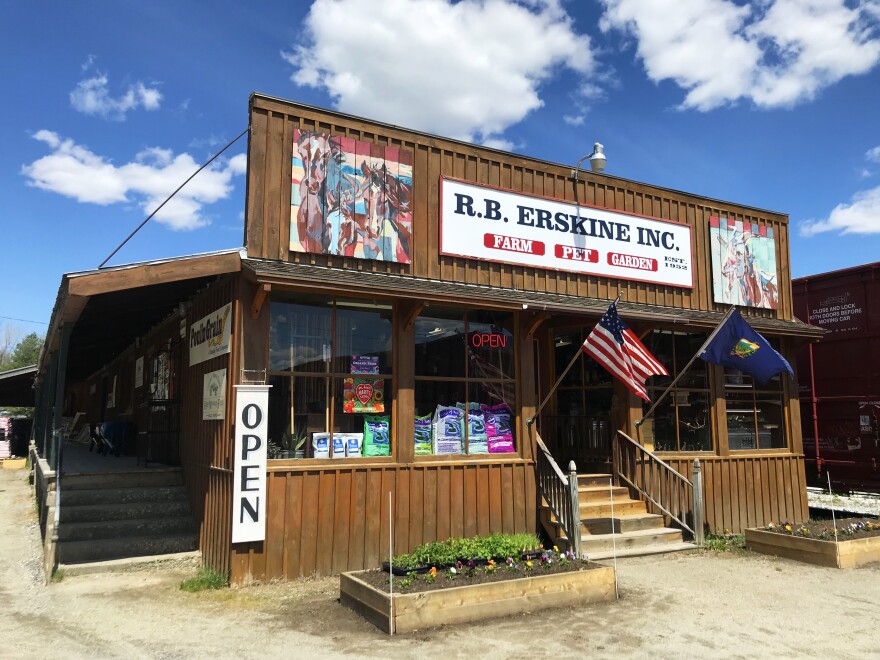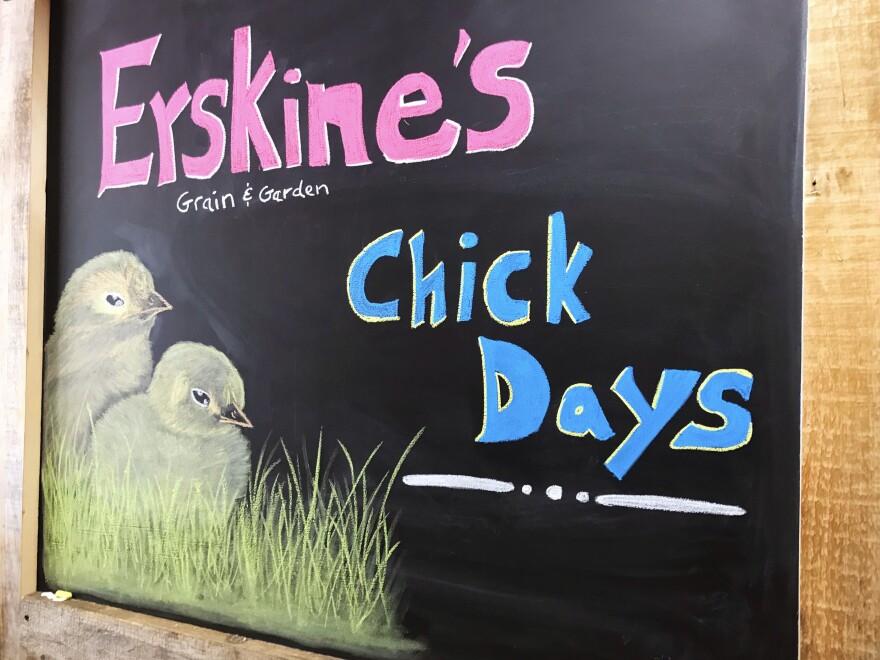When the owners of a generations-old family business in Chester, Vermont announced they were shutting down last year, a local couple took a leap and decided to buy the store. Their story is the next in our series about businesses that have started or substantially changed during the pandemic.
At the back of the wood-paneled storefront inside Erskine's Grain & Garden, next to a wall of maple sugaring supplies, hundreds of baby chicks are chirping from inside a series of wooden crates.
The chicks are part of an annual tradition at Erskine’s called “Chick Days.” For decades, Erskine’s has sold grain, hardware and other supplies to local farmers and gardeners.

The store has been in former owner Mike Erskine’s family since the early 1950s. They operated in the same way for years, with paper records and a customer credit system. They did fine, but in recent years, they were losing money.
Mike started trying to sell the business a few years back.
“And then the pandemic hit,” he said. “So, nope. We’ll just cut our losses.”
In late March 2020, Mike and his wife made the decision to wind down the business.
More from VPR: Meg Dawson Lost Her Job As A Baker Last Fall. Days Later, She Opened Das ButterHaus
Longtime customers and couple Burleigh Sunflower and Janessa Purney were sad to hear that news. They, like many people in the community, relied on Erskine’s.
“And you know, when we could sort of, socially distanced, see friends, they were just talking,” Janessa said. “Like, ‘Man, what am I going to … like what's going to happen? You guys should buy that store. You should. You'd be great at it. You love that stuff.’”
Janessa and Burleigh have raised animals and planted a garden for years, but they'd never run a business. They both worked in marketing in the ski industry most recently, but they decided to give it a go. They tried calling the store, but couldn't get through the busy phone lines, which were jammed with customers arranging pickup orders.
So, they sent Mike a letter.
“We got a letter,” Mike recalled. “They're interested in buying the business, and I explained to them we don't own the land the business sits on. We own an old building and some inventory. If they can make a go, go. They did, big way, big way!”

Mike said he was surprised someone was willing to take over the store in today’s economy.
“So much small, independent, retail’s been replaced by Amazon,” he said. “But there's a tight community here that will support small independent retail.”
While there’s a solid backstop of support in Chester, it hasn't all been smooth sailing. The sale process took about six months, and the store sits right next to railroad tracks. So like Mike said, they don't own the land beneath the building.
“We had to find a lender that would give us some money,” Janessa said. “And then the biggest piece was working with the state and Green Mountain Railroad on renegotiating the lease that the building sits on. And that took some time.”
And remember, this was all happening during a pandemic. Luckily for Janessa and Burleigh, the Erskines were patient, and by December, the sale closed.
“It was you know, walking in the door and walking around the warehouse a couple times and letting it sink in that this was all ours,” Janessa said. “And we needed to start paying back some loans pretty quick.”
So they built up their inventory and opened the business a few days before Christmas. Business kept building through the winter. Then came maple sugaring season.

“We went through and did our initial order for what we would need to get through most of the sugaring season,” Burleigh said. “And we got it all in, and we were sold out of a lot of it in the first couple of weeks, because of either new customers, or new people trying backyard sugaring, and that's kind of been the story for a couple things. You know, things are the same, but moving a little bit more than Mike ever had before. And that's good too. That's really fun and keeping us both very busy.”
Burleigh and Janessa attribute their success partially to people being at home more during the pandemic and trying to do more projects. And then there’s all those people buying up real estate.
“In Vermont, we're seeing a lot of people moving up, and then a lot of people have more time to do things in their backyards,” Burleigh said.
More from VPR: Chester Changes Marketing Message To Reach COVID Refugees
As for the business, Janessa said they’re not borrowing from their line of credit … every week.
“We're still in the process of building up inventory,” she said. “It feels good. I wish, you know — it would make an accountant probably cry, but it does feel good. It feels like we have enough product going out the door, right now, that we're doing all right.”
As more people become vaccinated and the pandemic winds down, Janessa and Burleigh are preparing for how things may change.

“Definitely makes me a little nervous to think about people having less time to spend on their backyard projects,” Janessa said. “But again, you know, like we said, hoping to differentiate ourselves with the level of service and information, we're able to provide the hands-on experiences, that kind of thing, to keep people interested and motivated and, you know, keep on going with their projects.”
And Janessa and Burleigh aren't alone in their work. They've hired a few employees, including former owner Mike Erskine, who works there four days a week. He says the business is in excellent hands.
Next in our series: an entrepreneur who closed one business in order to start up a new one with the goal of teaching children new languages and breaking down stereotypes.
Have questions, comments or tips? Send us a message or get in touch with reporter Henry Epp @TheHenryEpp.
We've closed our comments. Read about ways to get in touch here.




